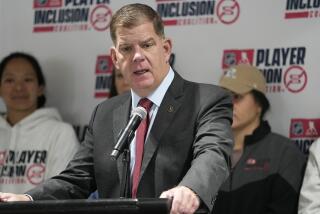Lemieux Makes a Huge Save
- Share via
PITTSBURGH — Franchise save, and a beauty.
A scorer nonpareil and one of the most dominating hockey players ever, Mario Lemieux pictured himself playing golf and raising his four children when he eased into a comfortable retirement at age 31 two years ago.
He had beaten countless goaltenders in his 13-year career and Hodgkin’s disease, too. His was an extraordinary story, of a French-Canadian youth who never finished high school and didn’t speak English until he was 18, yet revived a once-dying Pittsburgh Penguins team in a city that soon came to revere him.
He was so talented, so unrivaled as a breakaway scorer, so imaginative with a puck that he was content to retire at an age when many athletes peak. He had grown tired of the endless NHL season, the countless plane trips, the back pain that grew so persistent and the breakup of a championship team.
So, who could guess that only two years later, he would be back with the team?
He has not pulled on a hockey sweater in 2 1/2 years, and does not anticipate ever wearing one again in competition, yet Lemieux will make headlines and sports history again on Oct. 1 when the Penguins open against the Stanley Cup champion Dallas Stars.
On that night, Lemieux officially will be welcomed into the ranks of pro sports ownership--a group once reserved mostly for the very wealthy and socially elite--as the first superstar athlete to buy the team he once played for. Players such as Jaromir Jagr and Tom Barrasso, only months before his teammates, now become his employees.
From the penalty box to the owner’s box. Could this possibly be the same man who, rankled at the infrequent enforcement of obstruction rules, once called the NHL “a garage league?”
“I think there’s a lot of upside to the game,” Lemieux said of his decision to rescue the Penguins from bankruptcy and save the team for a second time. “I see the future as very bright for the NHL. At the same time, it was important for me to keep the Penguins in Pittsburgh.”
Losing the Penguins became a real possibility to Pittsburgh last October, when, citing $120 million in debt, co-owners Roger Marino and Howard Baldwin plunged the successful but undercapitalized franchise into federal bankruptcy.
Baldwin, the primary owner from 1991-97, lacked deep pockets and was involved in a succession of poor business deals. To raise the cash that kept the team afloat, Baldwin kept renegotiating contracts, signing away merchandising and advertising rights, agreeing to pay more and more rent to play in the aging Civic Arena. Finally, there was so much debt that even Marino and his $50 million cash infusion couldn’t save it.
Mario Lemieux could.
As the largest unsecured creditor in the bankruptcy, with $32.5 million in deferred salary and obligations, Lemieux had the most to lose--except for Pittsburgh, of course.
So, as Lemieux, agent Tom Reich and lawyers Doug Campbell and Chuck Greenberg dined at a steakhouse late one night, pondering their strategy and weighing their options so Lemieux would get his money, it was Super Mario who raised the question: Why not buy the team?
The price was right--businesses generally cost far less in bankruptcy court than on the open market--and saving the team would also mean saving most of Lemieux’s millions in unpaid salary. While the solution was simple, achieving it proved much harder than anyone in Lemieux’s circle ever imagined.
“I never really thought about buying a team before, but this was an unusual situation because of the team defaulting in my wages and the team going into bankruptcy,” Lemieux said. “That gave me an opportunity to buy the Penguins. It’s pure circumstances. In a way, there’s a sad side to it, because I didn’t get paid for my services.”
Hundreds of others weren’t getting paid, either--from former teammates Kevin Stevens and Luc Robitaille, who were owed millions, to caterers and laborers, who were owed thousands. To salvage the team, Lemieux’s advisers negotiated settlements with nearly every debtor, from the French bank that lent the Penguins $20 million to operate last season to the limousine company that once chauffeured Baldwin around town. They also raised $51 million from outside investors, and Lemieux agreed to exchange all of his deferred salary for the largest equity stake in the reorganized franchise.
The alternative? Watch the Penguins be sold out of town, probably to billionaire Paul Allen and Portland, and receive only pennies on all those millions he was owed.
“The Penguins have been a big part of my life for 15 years, and it would be very difficult for the city to lose the Penguins, especially after winning two Stanley Cups in the early 1990s,” Lemieux said.
Finally, after overcoming several technicalities that almost scuttled the plan, a deal was struck at 1 a.m. on Sept. 1, just eight hours before Lemieux met with the NHL and only after intervention by Sen. Rick Santorum, R-Pa., and Gov. Tom Ridge. Lemieux received a standing ovation from the NHL board.
“It’s a great feeling and a great relief,” Lemieux said. “Bankruptcy is a very difficult process. I had no idea it was this difficult to put a deal together. There were a lot of different parties. ... There were a lot of moving targets. That’s what made this so difficult, especially down the stretch.”
Now comes the really hard part: keeping the Penguins fiscally viable at a time when player salaries are soaring but TV revenues, especially compared to the NFL and major league baseball, are not. Lemieux already is seeking additional investors to keep the Penguins on solid financial ground until a new arena can be built in another 2-4 years.
But the name Lemieux can open many doors and sell a lot of seats. Season ticket sales are way up, thanks in part to a price reduction and a catchy ad campaign that features Lemieux in hockey sweater and business suit.
With a rent reduction from $6 million a year to $1 million and a yearly TV rights fee increase from $3 million to $9 million, the Penguins are no longer in trouble.
Once again, Lemieux appears to be at the top of his game.
“Mario has always been a player who has demanded a lot of respect just by his presence,” said Edmonton Oilers owner Glen Sather, who was enthused by Lemieux’s buyout. “He has an aura about him. He’s polite, respectful and intelligent, just as he was a player.”
And don’t think NHL board meetings won’t be livelier with an articulate, opinionated former player attending.
“I’m still a rookie in this game,” Lemieux said. “But I’m learning.”
More to Read
Go beyond the scoreboard
Get the latest on L.A.'s teams in the daily Sports Report newsletter.
You may occasionally receive promotional content from the Los Angeles Times.






